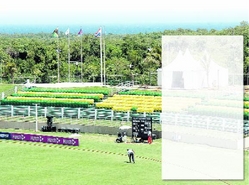UTech snubbed! - Government rejects university's bid for Trelawny Multi-purpose Stadium
Published: Wednesday | November 11, 2009


( L - R ) Morrison, Grange
Delay has finally turned into denial as the Government has officially rejected the University of Technology's (UTech) ambitious plan to transform the Trelawny Multi-purpose Stadium into its western campus.
The Government's failure to approve - before the start of the current academic year - the school's proposal that would utilise the massive complex, while facilitating the continued use of the stadium by any interested group, resulted in approximately 2,300 students from western Jamaica being refused a place at the university.
"We had given some students hope that we might have been able to take them, but we didn't hear anything so we had to put that on hold," said Professor Errol Morrison, president of the UTech.
Minister of Culture, Youth and Sports, Olivia 'Babsy' Grange, told our news team that the Government would not approve the plan submitted by the university, outlining its intentions to transform the largely idle facilities at the stadium into its western campus.
"The UTech proposal is not being considered, as proposed by UTech," she said.
However, Grange refused to say why the school's submission was rejected or whether the university would be allowed to fine-tune its initial proposal for reconsideration at a later date.
"I don't want to get into that," she said. The Government is yet to decide what exactly will be done with the stadium that is reportedly costing approximately $1 million per month to maintain. Grange said a feasibility study had been commissioned.
Morrison told The Gleaner on Monday that he was not aware that the university's bid was rejected.
"Nobody has invited me to the table for further discussions," he said.
Competition
In May this year, the culture, youth and sports minister told The Gleaner that UTech's proposal was facing competition from United States-based professional teams from the National Basketball Association and Major League Baseball.
But it seems the writings of a rejection were on the wall for at least four months.
In a letter to Professor Morrison dated July 15, 2009, a copy of which was obtained by The Gleaner, Prime Minister Bruce Golding noted that "The Government is not able to accede to your request at this time.
"A decision on the future of the Trelawny facility will only be made after careful consideration of a number of issues, including the financial liabilities incurred by its establishment, which must be discharged, and the demand for sports and entertainment facilities in western Jamaica for which the stadium was constructed."
However, the prime minister closed by stating that the Government would "continue to engage UTech in the consideration relating to the future of the stadium". The president remained hopeful.
Private sector support
The news of the official rejection has seemingly brought an end to the president's campaign, which was gaining support from key figures in the private sector.
"If the Government in its wisdom doesn't see that we are prepared to bring education at the tertiary level to the west, reduce their cost of maintenance for the stadium which we would take over, manage for them and make available to them, but at the same time nurturing the community and the whole development of sports, then I rest my case," Morrison said.
Associate Professor Dr Kofi Nkrumah-Young, vice-president of planning and operations at the UTech, revealed that the school received over 12,000 applications for the current academic year. At least 10,000 of the students who applied met the matriculation requirements. But the university was only able to accept a little over 3,000 students at its Papine campus.
Nkrumah-Young said an additional 1,000 students could have been accepted for the 2009/10 academic year had the Government approved the school's Trelawny stadium bid in time, while another batch of students could have been given early acceptance for the next academic year.
"We can't really put them on hold, we just had to refuse them - free them up so they can look for alternatives," he said.
tyrone.reid@gleanerjm.com












